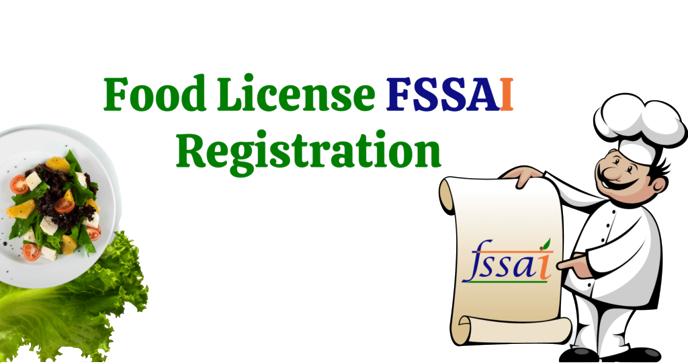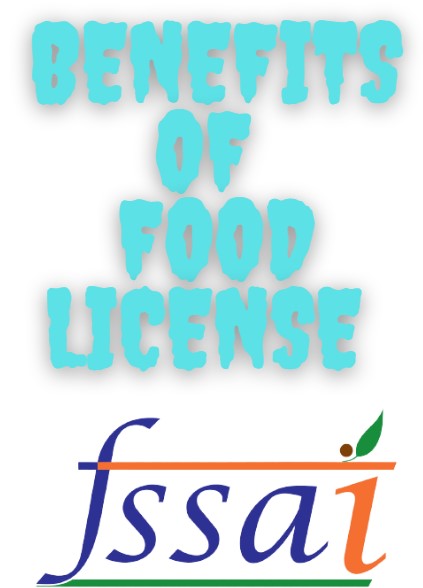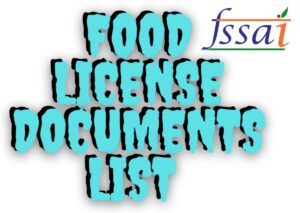
FSSAI Registration
What is FSSAI Registration ?
Food licensing in India refers to the process of obtaining a license or registration from the Food Safety and Standards Authority of India (FSSAI) to operate a food-related business. FSSAI is the regulatory body responsible for ensuring the safety and quality of food products in India.

The food licensing process in India is mandatory for all food-related businesses, including food manufacturers, processors, transporters, and sellers. The objective of food licensing is to ensure that food products are safe for human consumption and comply with the FSSAI regulations and guidelines.
The food licensing process involves the submission of an application to the FSSAI along with the required documents, such as proof of identity and address, food safety management plan, and product testing reports. The FSSAI will review the application and documents and issue a license or registration based on the type and size of the business.
Food licensing in India is classified into three categories – Basic Registration, State License, and Central License. The category of the license required depends on the turnover of the business, the type of food products, and the scale of operation. Once a food license is issued, it is valid for a period of 1 to 5 years, after which it needs to be renewed.
It is important for food-related businesses in India to obtain a food license to comply with the regulatory requirements and ensure the safety and quality of their food products. Failure to obtain a food license or non-compliance with the FSSAI regulations can result in penalties, fines, and even closure of the business.
Food Business Operators (FBOs) Who Require FSSAI Registration
In India, all Food Business Operators (FBOs) are required to register with the Food Safety and Standards Authority of India (FSSAI) to operate their food-related business. However, the type of FSSAI registration required depends on the size and scale of the business.
FBOs that require FSSAI registration include:
- Food manufacturers and processors
- Food importers and exporters
- Food transporters and storage operators
- Food retailers and wholesalers, including supermarkets, grocery stores, and food vendors
- Food catering and canteen services, including those provided by schools, colleges, hospitals, and offices
- Food packaging and labeling businesses
- Food vending machines
- Online food businesses, including food delivery apps and online marketplaces
- Food supplements and nutraceuticals manufacturers and sellers
- Meat Processing and Fish Processing units.

FSSAI registration is mandatory for all FBOs, regardless of the size of their business or the quantity of food products they handle. FBOs can choose between Basic Registration, State License, or Central License, depending on the type and scale of their business.
It is important for FBOs to obtain FSSAI registration to ensure the safety and quality of their food products and comply with the regulatory requirements of the FSSAI. Failure to register with FSSAI or non-compliance with FSSAI regulations can result in penalties, fines, and even closure of the business.
Benefits of obtaining a food license

There are several benefits to obtaining a food license in India:
Ensures compliance with regulations: Obtaining a food license ensures compliance with the regulatory requirements set forth by the Food Safety and Standards Authority of India (FSSAI), which helps to maintain the safety and quality of food products.
Builds consumer confidence: Consumers are more likely to trust and purchase food products from businesses that have a food license. A food license serves as a mark of authenticity and can help build consumer confidence in the safety and quality of the food products.
Enhances marketability: A food license can improve the marketability of a business by demonstrating compliance with food safety standards, which can help attract more customers and increase sales.
Protects the health of consumers: Obtaining a food license ensures that the food products are safe for human consumption, which helps to protect the health of consumers.
Legal protection: A food license provides legal protection to businesses against liability claims related to food safety and quality issues.
Avoids penalties and fines: Failure to obtain a food license or non-compliance with FSSAI regulations can result in penalties, fines, and even closure of the business. Obtaining a food license helps to avoid such penalties and fines.
In summary, obtaining a food license is essential for any food-related business in India. It not only helps to comply with the regulatory requirements but also builds consumer confidence, enhances marketability, protects the health of consumers, and provides legal protection to businesses.
Types of FSSAI Food License in India
There are three types of FSSAI food licenses in India, which are classified based on the size and scale of the food-related business:
-
Basic FSSAI Registration: This type of registration is suitable for small food-related businesses with an annual turnover of up to Rs. 12 lakhs. Basic registration is a simple and easy process that involves submitting basic details of the business and a self-attested declaration of food safety compliance.
-
State FSSAI License: This type of license is suitable for medium-sized food-related businesses with an annual turnover between Rs. 12 lakhs and Rs. 20 crores. State FSSAI license requires more detailed documentation and a food safety management plan, and is issued by the State Government.
-
Central FSSAI License: This type of license is suitable for large-sized food-related businesses with an annual turnover exceeding Rs. 20 crores. Central FSSAI license requires a more comprehensive documentation process, including product testing reports and other relevant details, and is issued by the Central Government.
The type of FSSAI food license required depends on the scale of the food-related business, and all FBOs are required to obtain the appropriate license based on their annual turnover. In addition to the basic registration or license, FBOs are also required to maintain and implement a Food Safety Management System (FSMS), which includes regular inspections and audits to ensure the safety and quality of the food products.
Documents Required for FSSAI Registration
The documents required for FSSAI registration in India vary depending on the type of registration, but typically include the following:
- Basic FSSAI Registration:
- Completed and signed Form A
- Identity proof of the proprietor, partner or director
- Address proof of the business premises
- Passport size photograph of the proprietor, partner or director
- Proof of annual turnover or self-declaration of the same

- State FSSAI License:
- Completed and signed Form B
- List of food products to be manufactured, processed or sold
- Blueprint/layout plan of the processing unit
- Food Safety Management System (FSMS) plan
- List of equipment and machinery to be used
- Identity and address proof of the proprietor, partner or director
- Photographs of the processing unit and machinery
- Proof of possession of the premises
- Partnership deed, MOA, or AOA, depending on the type of business entity
- Central FSSAI License:
- Completed and signed Form B
- List of food products to be manufactured, processed or sold
- Blueprint/layout plan of the processing unit
- Food Safety Management System (FSMS) plan
- List of equipment and machinery to be used
- Identity and address proof of the proprietor, partner or director
- Photographs of the processing unit and machinery
- Proof of possession of the premises
- Partnership deed, MOA, or AOA, depending on the type of business entity
- Certificate of incorporation or registration
- Form IX: Nomination of persons by a company along with the board resolution
These are the basic documents required for FSSAI registration, and depending on the specific type of business and location, additional documents may be required. It is advisable to consult with a food safety consultant or FSSAI expert to ensure that all necessary documents are prepared and submitted accurately to avoid any delays or rejections in the registration process.
Food License Registration Process
- Step 1: Once you get in touch with our FSSAI experts regarding the registration process, Our agents will set up a call with you later and collect all the necessary documents to start the registration process.
- Step 2: Our expert team will start the FSSAI registration process for your food business. The process will be completely transparent. You will get timely updates from our experts.
- Step 3: The officials from the food department will inspect your food business. After successful inspection, your food business is now registered and you will get the 14 digit FSSAI license.
Get in touch if you are interested or any Query

